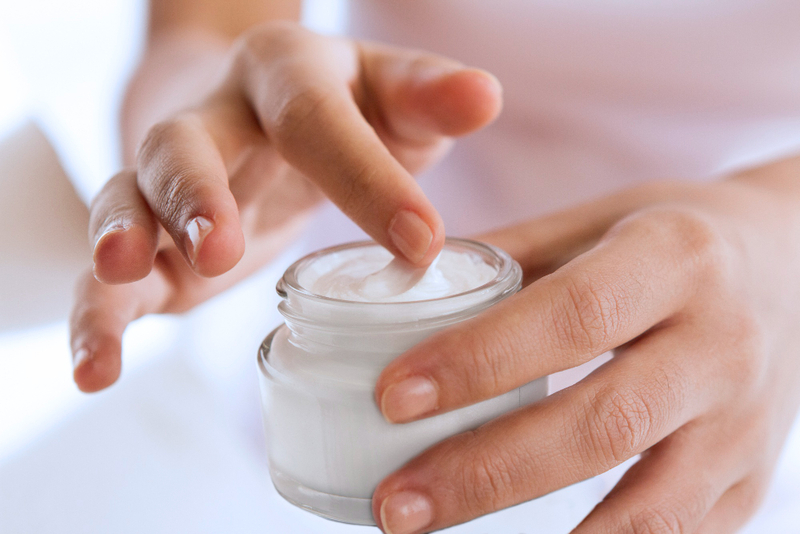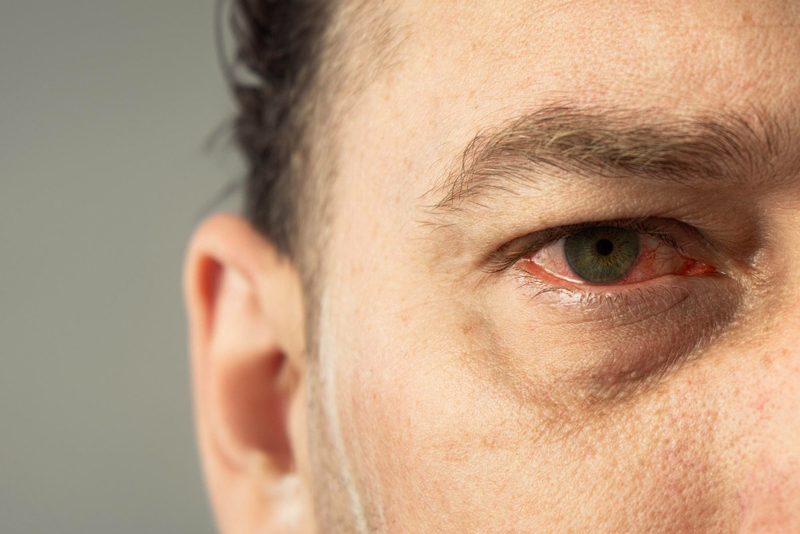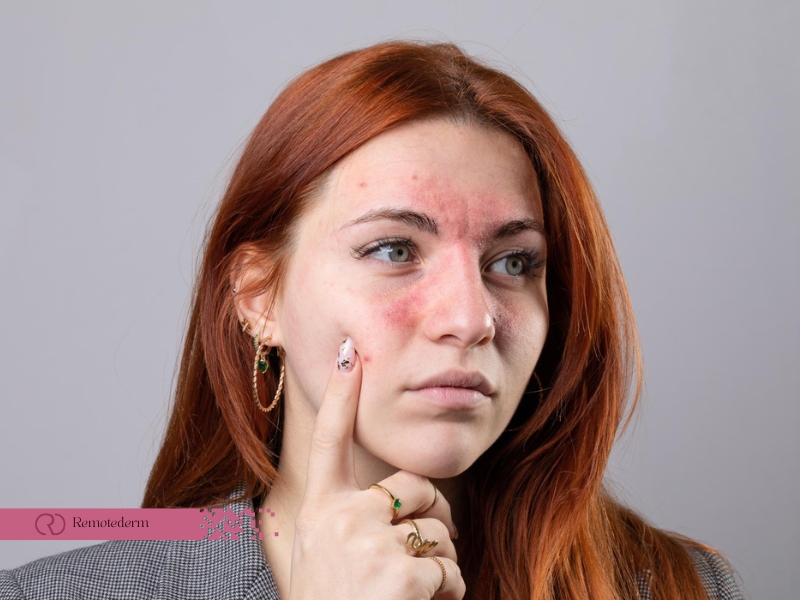Rosacea is a common skin condition of most Canadians that is incurable. It is characterized by a red face, visible blood vessels, and sometimes pimples. The disease can hardly be controlled, but understanding existing treatments can relieve the symptoms of the disease. This article is dedicated to whether rosacea can be cured, how to treat it, and what options you can find in Canada.
What is Rosacea?
Rosacea is a common, chronic skin condition that generally affects the face in many forms: persistent redness, visible blood vessels, bumps, and pimples. Some might feel it stitch in the eye which is called ocular rosacea. In severe cases, the skin may thicken, especially on and around the nose. The exact cause of rosacea is not known, but it is often believed to be a combination of genetic predisposition and environmental factors that contribute to it. Some of the factors that may trigger the condition, also worsening the effect, include — but are not limited to — sunlight, stress, hot weather, alcohol, and spicy foods.
- Persistent Redness: Red rashes that flare up frequently, which may look like a sunburn or blush that never seems to go away.
- Visible Blood Vessels: Broken blood vessels that lie near the skin’s surface and are highly conspicuous.
- Bumps and Pimples: Small red solid bumps or pus-filled pimples that might occur.
- Eye Irritation: Ocular Rosacea is a condition that causes red, dry, and irritated eyes, and if not treated, can lead to more severe problems.
- Thickened Skin: The skin, mainly around the nose, can become thicker and bumpy with time.
Can Rosacea Be Cured?
The shortest answer is no. Unfortunately there is no known cure for Rosacea, making it a chronic condition that can only be managed. However, with proper management and certain therapies, quality of life can be improved and symptoms associated with this condition can be reduced. Effective management involves a combination of medical treatments and lifestyle modifications. These, combined with consistent use of mild topicals, sun protection, and avoidance of the triggers, form the recipe for proper control of rosacea. Work together with a healthcare provider to customize treatments individually based on requirements.
Rosacea Treatment Options
Knowledge of the treatment options available allows one to be better prepared to deal with the signs and symptoms of rosacea. From topical to oral medication and advanced therapy, options are vast. To this end, even in Canada, online rosacea treatment, which includes virtual consultation and prescription services that make it even more convenient for patients to seek treatment from their homes.
Topical Treatments
Several topical treatments can help manage rosacea symptoms:
- Metronidazole: This antibiotic cream or gel reduces inflammation and bacteria on the skin. It is often the first-line treatment for rosacea.
- Azelaic Acid: Available in gel or foam form, azelaic acid helps reduce redness and swelling and can improve the skin’s appearance.
- Brimonidine Gel: Specifically formulated to narrow blood vessels temporarily, this gel helps reduce visible redness within hours of application.

Oral Medications
Oral medications may be prescribed for more serious patients and cases:
- Antibiotics: such as doxycycline, which can reduce inflammation and are often used for their anti-inflammatory rather than antibacterial properties
- Isotretinoin: A potent medication commonly used for severe acne, isotretinoin can also be effective in treating severe rosacea, especially when other treatments have failed
Laser and Light Therapy
Popular laser and phototherapy treatments for rosacea in Canada are:
- Pulsed-dye laser (PDL): targets and damages visible blood vessels in the skin, reducing redness and bleeding.
- Intense Pulsed Light (IPL): Uses diffuse light to treat red blood cells and visible blood vessels that results in reduced wrinkles and an improved skin tone.
Can Rosacea Be Cured Permanently?
Although rosacea cannot be cured permanently, continued treatment and stimulation can help clear skin. Typical triggers are:
- Hot drinks: Coffee, tea, and other hot beverages can cause flushing.
- Spicy foods: Strongly spiced foods can trigger rosacea symptoms.
- Wine: Especially red wine, is known to stimulate many individuals.
- Extreme Heat: Hot, humid weather can make rosacea worse.
- Stress: Emotional stress is a major trigger for many rosacea sufferers.
Identifying and avoiding individual triggers is important in the long-term management of rosacea. Writing a diary of symptoms can help identify patterns and specific triggers, potentially leading to more targeted avoidance strategies.
Can Eye Rosacea Be Cured?
Eye rosacea also known as ocular rosacea is a chronic inflammation of the eye. It is often associated with facial rosacea. Although completely incurable, it can be effectively managed to reduce symptoms and improve eye health. Common symptoms include:
- Redness
- Dryness
- Irritation
- Swollen eyelids
Eye Rosacea treatment options include:
- Good hygiene: Cleaning your eyelids regularly can help reduce irritation and prevent them from burning.
- Artificial tears: These drops provide relief from burning and flushing.
- Medications: Antibiotics may be prescribed to reduce inflammation and control ocular rosacea symptoms.
In severe cases, referral to an ophthalmologist may be necessary. Continued management can significantly improve symptoms. Additionally, lifestyle changes to avoid triggers such as spicy foods, alcohol and extreme heat can help reduce the frequency and severity of flare-ups

Can Mild Rosacea Be Cured?
Most cases of mild rosacea need only lifestyle and OTC interventions. Key recommendations are:
- Gentle Skincare: Avoid known skin irritants, and select mild skin care labeled for sensitive skin. In general, alcohol, fragrances and other skin irritants should be avoided.
- Sun Protection: Daily use of a broad-spectrum sunscreen will help shield the skin from the damaging effects of the sun. Sun exposure is a common trigger for rosacea.
- Dietary Modifications: One needs to steer clear of known triggers including, but not limited to, hot beverages, spicy foods, and alcohol.
Stress management techniques are also helpful in reducing flare-ups with emotional stress, for example, yoga techniques, meditation, and regular exercise.
Final Thoughts
Though incurable, rosacea can be managed appropriately. Innumerable treatment types and options are available to treat rosacea in Canada, from topical and oral medications to laser treatments to online consultations. A person with rosacea, as long as they can identify and avoid their triggers, maintain a gentle skincare routine, and seek appropriate treatment, should not let having the condition come in the way of living a comfortable and confident life.
FAQs
1. What foods should I avoid with rosacea?
Steer clear of hot drinks, spicy foods, and alcohol, as all may lead to flare-ups of the condition. Also, foods such as dairy and histamines are known to exacerbate symptoms in patients who have the condition.
2. Does stress cause rosacea flare-ups?
Stress has been identified as a trigger for symptoms associated with rosacea. Learn methods to handle stress to reduce the frequency of flare-ups of a particular condition.
3. Does rosacea affect one age group more than others?
Commonly rosacea impacts people who are between the ages of 30 and 50, although it can start at any age and can both affect both men and women.
4. Can weather changes affect rosacea?
Though the answer may be yes since extreme temperatures and sun exposure are known to make rosacea even worse. Wind and changes in humidity are also potential factors in flare-ups. These reasons necessitate the protection of skin under weather changes.
